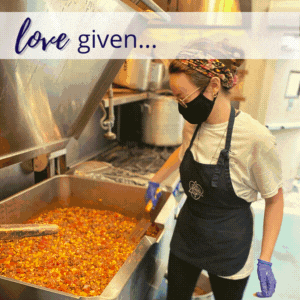By Naim Edwards, Serving with Cap Corps in Detroit
| Naim Edwards, Capuchin Corps Volunteer |
Just this morning, as I was preparing to write this blog, I learned a new term – environmental racism. It is defined by the Energy Justice Network as “the disproportionate impact of environmental hazards on people of color.” I presume most of us consider hazards to include living near a landfill, incinerator, coal-fired power plant, or any entity that may contain or emit chemicals harmful to us. I agree with that, but I also believe being separated from a healthy environment to be a form environmental racism.
For example, forcing Native Americans to live on reservations, which are often areas difficult for humans to subsist in due to poor soils (for agriculture) and a lack of human resources. Similarly, concentrating “brown” people in urban slums (poor in soil and resources) and using policies and systems to keep them there are forms of environmental racism. Additionally, I’d argue that destroying people’s environments through war, deforestation, or contamination so that it is no longer desirable to live there is also a form of environmental racism. Both the contaminated and the deficient aspects of this injustice are prevalent in Detroit, a city marked by fossil fuel refineries, power plants, and incinerators, as well as communities that have been neglected and deprived of resources.
My life in Detroit focuses on restoring natural beauty to the city. I do this through native plant and vegetable gardening with the understanding that healthier environments foster healthier minds and spirits. Aside from increased access to healthy foods, it is well documented that urban gardens and green spaces contribute to more positive, resilient individuals and communities . Thus, I am part of a larger movement to empower people simply by making their worlds look better. Of course, organizing others in the gardening and restoration process further strengthens and multiplies its benefits.
| Children learn to identify insects, plants, and other organisms. |
Everyone has the right to interact with living things other than humans and our pets. We should not have to leave our communities to experience nature’s beauty. We share our planet with countless other organisms; their presence in our lives is a source of stability, hope, and inspiration. The value of watching a plant grow, birds singing and playing at a feeder, or butterflies fluttering about should not be underestimated or taken lightly. I have witnessed first hand the power and wonder of reconnecting people to nature.
| Some Food Warriors learning about biodiversity at D-Town Farm in Detroit. |
With the implementation of a community garden, I invited a small group of people to engage in the supposedly mundane task of starting seeds for the project. I had the fortune of at least having their curiosity to start with, and once the seeds begin to sprout, there was an air of excitement and praise of new life and opportunity! People who chose not to engage in planting seeds were jealous that they didn’t participate in giving life to our little plants, while those who did were joyful and anxious to take care of their new found responsibilities. I’ve also witnessed anxious people dismantle their fear of spiders or snakes after having the opportunity to handle and observe these creatures in a safe way.
| A young Food Warrior has made a new friend during a BioBlitz. |
Imagine cities full of people giddy and yearning for spring to start, not simply to get away from our cold, seemingly lifeless winter, but ready to witness and support new life. These attitudes can be extended into our homes, schools, and work places. New life inspires new ideas – new beginnings. Detroit’s marginalized communities need to feel and experience revitalization, and adding jobs (which isn’t really happening) is not enough; we must add substance, biodiversity, and relearn vitality from nature with all of its power and life giving energy.
To learn more about Capuchin Franciscan Volunteer Corps, click here!


 Thousands of faith-based service opportunities can be at your fingertips with the RESPONSE. Download the latest edition today!
Thousands of faith-based service opportunities can be at your fingertips with the RESPONSE. Download the latest edition today!
